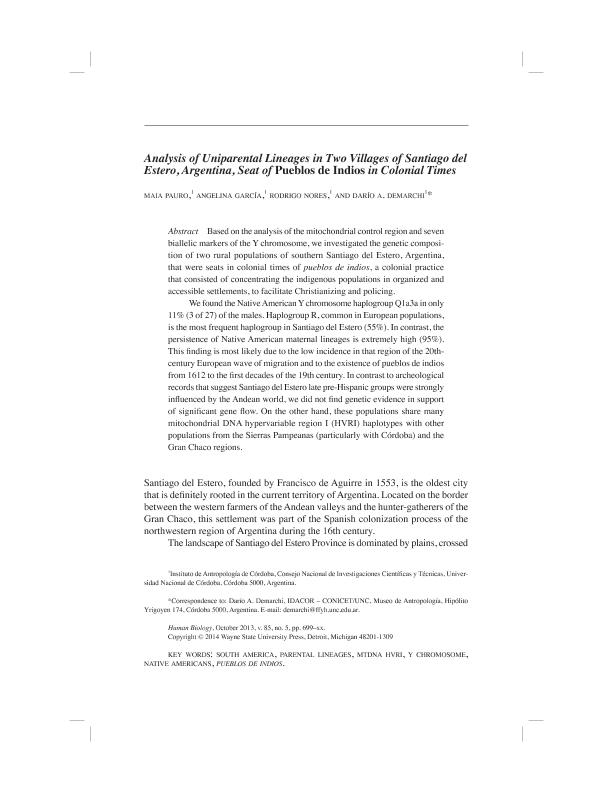Mostrar el registro sencillo del ítem
dc.contributor.author
Pauro, Maia

dc.contributor.author
García, Angelina

dc.contributor.author
Nores, Rodrigo

dc.contributor.author
Demarchi, Dario

dc.date.available
2017-01-11T20:55:38Z
dc.date.issued
2013-10
dc.identifier.citation
Pauro, Maia; García, Angelina; Nores, Rodrigo; Demarchi, Dario; Analysis of Uniparental Lineages in Two Villages of Santiago del Estero, Argentina, Seat of Pueblos de Indios in Colonial Times; Wayne State University Press; Human Biology; 85; 5; 10-2013; 699-719
dc.identifier.issn
0018-7143
dc.identifier.uri
http://hdl.handle.net/11336/11159
dc.description.abstract
Based on the analysis of the mitochondrial control region and seven biallelic markers of the Y chromosome, we investigated the genetic composition of two rural populations of southern Santiago del Estero, Argentina, that were seats in colonial times of pueblos de indios, a colonial practice that consisted of concentrating the indigenous populations in organized and accessible settlements, to facilitate Christianizing and policing.
We found the Native American Y chromosome haplogroup Q1a3a in only 11% (3 of 27) of the males. Haplogroup R, common in European populations, is the most frequent haplogroup in Santiago del Estero (55%). In contrast, the persistence of Native American maternal lineages is extremely high (95%). This finding is most likely due to the low incidence in that region of the 20thcentury European wave of migration and to the existence of pueblos de indios from 1612 to the first decades of the 19th century. In contrast to archeological records that suggest Santiago del Estero late pre-Hispanic groups were strongly influenced by the Andean world, we did not find genetic evidence in support of significant gene flow. On the other hand, these populations share many mitochondrial DNA hypervariable region I (HVRI) haplotypes with other populations from the Sierras Pampeanas (particularly with Córdoba) and the Gran Chaco regions.
dc.format
application/pdf
dc.language.iso
eng
dc.publisher
Wayne State University Press

dc.rights
info:eu-repo/semantics/openAccess
dc.rights.uri
https://creativecommons.org/licenses/by-nc-sa/2.5/ar/
dc.subject
Mtdna Hvri
dc.subject
Y Chromosome
dc.subject
Native Americans
dc.subject
Pueblos de Indios
dc.subject
South America
dc.subject
Parental Lineage
dc.subject.classification
Otras Humanidades

dc.subject.classification
Otras Humanidades

dc.subject.classification
HUMANIDADES

dc.title
Analysis of Uniparental Lineages in Two Villages of Santiago del Estero, Argentina, Seat of Pueblos de Indios in Colonial Times
dc.type
info:eu-repo/semantics/article
dc.type
info:ar-repo/semantics/artículo
dc.type
info:eu-repo/semantics/publishedVersion
dc.date.updated
2017-01-06T19:52:24Z
dc.journal.volume
85
dc.journal.number
5
dc.journal.pagination
699-719
dc.journal.pais
Estados Unidos

dc.journal.ciudad
Detroit
dc.description.fil
Fil: Pauro, Maia. Consejo Nacional de Investigaciones Científicas y Técnicas. Centro Científico Tecnológico Córdoba. Instituto de Antropología de Córdoba; Argentina. Universidad Nacional de Córdoba; Argentina
dc.description.fil
Fil: García, Angelina. Consejo Nacional de Investigaciones Científicas y Técnicas. Centro Científico Tecnológico Córdoba. Instituto de Antropología de Córdoba; Argentina. Universidad Nacional de Córdoba; Argentina
dc.description.fil
Fil: Nores, Rodrigo. Consejo Nacional de Investigaciones Científicas y Técnicas. Centro Científico Tecnológico Córdoba. Instituto de Antropología de Córdoba; Argentina. Universidad Nacional de Córdoba; Argentina
dc.description.fil
Fil: Demarchi, Dario. Consejo Nacional de Investigaciones Científicas y Técnicas. Centro Científico Tecnológico Córdoba. Instituto de Antropología de Córdoba; Argentina. Universidad Nacional de Córdoba; Argentina
dc.journal.title
Human Biology

dc.relation.alternativeid
info:eu-repo/semantics/altIdentifier/url/http://www.bioone.org/doi/abs/10.3378/027.085.0504
dc.relation.alternativeid
info:eu-repo/semantics/altIdentifier/doi/http://dx.doi.org/10.3378/027.085.0504
Archivos asociados
